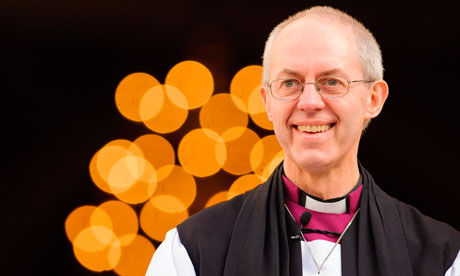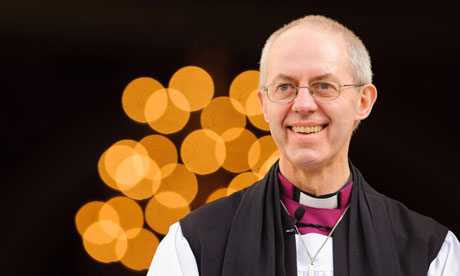TERENCE BLACKER in The Independent
Monday 21 October 2013
He fights the wrongdoings of the payday loaners and now the Big Six – what next?
News broke this weekend that the Archbishop of Canterbury and the Duchess of Cornwall have held a meeting to discuss poverty. Both have expressed their concerns about the behaviour of payday loan firms, and have supported the idea of local credit unions. They also share a belief in a pragmatic approach to contemporary problems: Justin Welby has suggested that the Church of England might set up shop as a moneylender while the duchess joined the London Mutual Credit Union in Peckham, where she is not a resident.
All this is something of a break with the recent past. Imagine a similar meeting but between the duchess’s husband, Prince Charles, and the last Archbishop of Canterbury, Dr Rowan Williams: the agonising over terms of reference, the anguished beard-tugging over what exactly constituted poverty, the reference to St Thomas Aquinas and Laurens van der Post, the ever-thickening fog of well-meaning abstraction.
The idea of a dynamic former oil executive taking over as head of the Anglican Church has, admittedly, taken some getting used to. Like many non-believers, I rather liked the gentle, beardy Dr Williams, with his tentative, non-prescriptive faith. I sensed that his God and my good were vague enough to be rather similar.
The new action-man Archbishop seems to have no time for windy theorising. His progress has been that of a businessman with a meeting to get through, rather than an academic wrestling with an abstruse intellectual problem.
Apart from his payday initiative with the Duchess of Cornwall, he has recently attacked energy companies for maximising profit, spoken out against the pursuit of economic growth, expressed views about same-sex marriage, regretted the influence of the colonial past in the running of the Church, welcomed tax changes for married couples, and supported the building of affordable houses.
He is, in other words, a thoroughly modern public figure, who sounds off confidently and unambiguously about the issues of the day. A glance at the nice old duffers who have preceded him – Coggan, Runcie, Carey, Williams – is enough to reveal how far he has already taken the church away from the old, grey establishment of which it was once part.
It is probably a sensible move. The words of politicians have become increasingly woolly and meaningless (last week, for example, we learned that coalition government means that the Liberal Democrats can simultaneously support and oppose free schools), and the public is looking for guidance elsewhere.
Archbishop Welby is moving towards the real shadow cabinet, the small group of public figures who speak out and influence opinion on the issues of the day. In this unofficial opposition, he could take on the role of Home Secretary, while Jamie Oliver is in charge of Health, Stephen Fry speaks on culture, and Chris Packham covers the environment. Among the junior shadow ministers can be found young thrusters like Russell Brand, Charlotte Church, Louise Mensch and Joey Barton.
In their own individual ways, these people – celebrities with attitude – have more sway over the way people think and the topics that matter than any number of the Gregs and Nicks who are in government.
They now include the Archbishop of Canterbury.
A few more telling soundbites, and he will be on The Graham Norton Show, telling twinkly anecdotes on Desert Island Discs or contributing to a “What Turns Me On” lifestyle column in one of the Sunday newspapers.
For those who like the Anglican Church to be a solid, slightly dull presence in our national life, the Welby way will no doubt be distressing – he is hardly, in the words of the hymn, a still, small voice of calm. But at a time when politicians are trying to please everyone, the press is widely distrusted, and the BBC has lost its way, perhaps it is not such a terrible thing that the Church of England has found itself a confident, slightly bumptious new voice.


